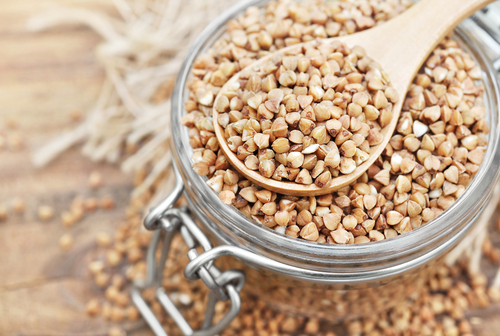Description
SARRACENE WHEAT, A PSEUDOCEREAL VERY RICH IN MINERALS
Buckwheat is rich in minerals when compared to rice, wheat, or corn. A plate of about 170 grams of cooked buckwheat covers our daily needs in the following percentages:
34% manganese: essential mineral for the proper functioning of our metabolism, for the development and growth of the body and also acts as an antioxidant for our defenses.
28% copper: normally in deficit in the western diet, it is a trace element with positive effects on heart health.
21% magnesium: it is an essential mineral that could reduce the risk of chronic diseases such as type 2 diabetes and cardiovascular problems.
17% phosphorus: this mineral plays a key role in the growth and maintenance of body tissues.
18% fiber: buckwheat contains it in an interesting amount (2.7% of cooked buckwheat is fiber), basically in the form of cellulose and lignin. The outermost part of the grain contains resistant starch that could act as a prebiotic fiber (feeding the healthy intestinal flora of our colon).
Compared to other cereals, the minerals in cooked buckwheat are absorbed particularly well, the reason being that it has a relatively low content of phytic acid, an inhibitor of mineral absorption found in most cereals.
1. IMPROVES CONTROL OF BLOOD SUGAR LEVELS
High blood sugar levels maintained over time lead to various chronic diseases such as type 2 diabetes. For this reason, the increase in blood sugar produced by food should be moderated.
Buckwheat contains a significant amount of fiber, and leads to a slow and progressive rise in blood sugar levels.
2. GOOD FOR THE HEART AND FOR THE CIRCULATION
3. REDUCING THE RISK OF COLON CANCER
4. ALLERGIES AND SPECIAL PRECAUTIONS FOR CELIACS
COMPOSITION QUANTITY (GR) CDR (%)
Kcalories 355 18.5%
Carbohydrates 30.6 9.8%
Proteins 28.6 59.8%
Fiber 17.7 59%
Fat 9.2 17.3%
MINERALS QUANTITY (MG) RDA (%)
Sodium 5 0.3%
Calcium 49 4.1%
Iron 8.5 106.3%
Magnesium 0 0%
Phosphorus 1022 146%
Potassium 993 49.7%
VITAMINS QUANTITY (MG) RDA (%)
Vitamin A 0.01 1.1%
Vitamin B1 2 166.7%
Vitamin B2 0.72 55.4%
Vitamin B3 9.23 0.1%
Vitamin B12 0 0%
Vitamin C 0 0%





